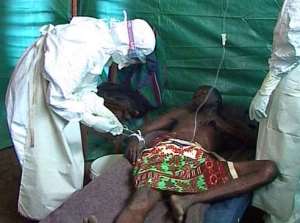
23 October 2014, Dar es Salam – “Ebola is a global issue and we all need to be putting our full attention behind it.” This was the message from Dr Susan Mboya-Kidero, President of The Coca-Cola Africa Foundation (TCCAF), at this year's Coca-Cola media breakfast.
The breakfast formed part of the annual CNN Multichoice African Journalist of the Year Awards event which took place this week in Dar es Salaam, Tanzania.
The Coca-Cola Africa Foundation breakfast, which has become a key part of the programme's events, sought to highlight the various issues that Ebola is raising globally and how Africans should be responding. The panel discussion was chaired by Ferial Haffajee, Editor of the City Press newspaper. She says: “As African journalists we have failed at covering this story. We have been so caught up in covering the story of 'Africa Rising' that we have ignored this one.”
West Africa is dealing with the worst Ebola outbreaks in history. The latest figures show that4 877 people have died so far in the worst-affected West African nations of Guinea, Liberia and Sierra Leone. In total, there have been more than 9 000 confirmed or suspected cases, mostly in West Africa.
The outbreak is leaving West Africa and countries, still recovering from the repercussions of civil war, with significant social, ethical, political, economic and medical challenges.
According to Mboya-Kidero the next six weeks will be key to turning this around. She says: “We are still in a window where this can be checked – the projections that only a few weeks ago seemed far-fetched have now been surpassed. The World Health Organization (WHO) now suggests that 1.4 million people could become infected.”
The panel also included Mboya-Kidero, CNN news anchor Isha Sesay, Dr Janneth Mghamba, the Assistant Director Epidemiology and Disease Control for Tanzania and Amadou Mahtar Ba, Co-Founder and Executive Chairman of AllAfrica Global Media.
The discussion focused on how African journalists have a responsibility to be better story tellers about this epidemic. “It is ridiculous that this only became a big global story when two US citizens were infected. This has taken our focus off the epicenter of the crisis in West Africa. The stories of what it is doing to these families haven't been told well,” says Sesay.
Mahtar Ba challenged journalists to ask the right questions of their governments and leaders. He also touched on how nations need to be ready to receive Ebola refugees. “A far-reaching effect will be the orphans and survivors of this disease. They are being ostracized and are now facing the loss of their families alone. As media we can help to relay the facts about this and to help people understand that they are not infectious.”
Mghamba also said the ministries of health rely on journalists to help them spread their messages. She says: “The media can help to share the facts around the disease. How people become infected and what is being done to try and arrest the spread of the disease within a country.”
However, despite this there are some success stories. Nigeria and Senegal have been declared Ebola free. Nigeria used its learnings from a polio outbreak a few years ago to help contain the spread of the disease. “It made use of airline manifests, phone records and spoke to its citizens like adults – telling them the facts they need to know,” comments Mboya-Kidero.
The CNN Multichoice African Journalist of the Year Awards celebrates excellence in journalism. This year Sean Christie who works freelance for Landbouweekblad and The Mail & Guardian, won the Coca-Cola sponsored Economics and Business Award for his piece “Zimbabwe's Forests Go Up in Smoke”
Kenyan journalist Joseph Mathenge was awarded the overall 'CNN MultiChoice African Journalist of the Year' Award for his work 'Images of Terror', which documented the moments of terror experienced by shoppers when Westgate Mall in Nairobi was attacked by unidentified gunmen in September 2013.
About The Coca-Cola Africa Foundation
The Coca-Cola Africa Foundation (TCCAF) is an entity of Coca-Cola that is concerned with community enhancement projects throughout Africa. TCCAF has committed resources and is collaborating with other organizations to provide communities with improved access to safe drinking water and sanitation through the Replenish Africa Initiative (RAIN); to contribute to strengthening Africa's health systems; and to create opportunities for youth empowerment. RAIN is TCCAF's signature program and serves as Coca-Cola's response to Africa's water challenges.




 Tuesday’s downpour destroys ceiling of Circuit Court '8' in Accra
Tuesday’s downpour destroys ceiling of Circuit Court '8' in Accra
 SOEs shouldn't compromise on ethical standards, accountability – Akufo-Addo
SOEs shouldn't compromise on ethical standards, accountability – Akufo-Addo
 Father of 2-year-old boy attacked by dog appeals for financial support
Father of 2-year-old boy attacked by dog appeals for financial support
 Jubilee House National Security Operative allegedly swindles businessman over sa...
Jubilee House National Security Operative allegedly swindles businessman over sa...
 Nobody can order dumsor timetable except Energy Minister – Osafo-Maafo
Nobody can order dumsor timetable except Energy Minister – Osafo-Maafo
 Mahama wishes National Chief Imam as he clock 105 years today
Mahama wishes National Chief Imam as he clock 105 years today
 J.B.Danquah Adu’s murder trial: Case adjourned to April 29
J.B.Danquah Adu’s murder trial: Case adjourned to April 29
 High Court issues arrest warrant for former MASLOC Boss
High Court issues arrest warrant for former MASLOC Boss
 Align academic curriculum with industry needs — Stanbic Bank Ghana CEO advocates
Align academic curriculum with industry needs — Stanbic Bank Ghana CEO advocates
 Election 2024: We'll declare the results and let Ghanaians know we've won - Manh...
Election 2024: We'll declare the results and let Ghanaians know we've won - Manh...
